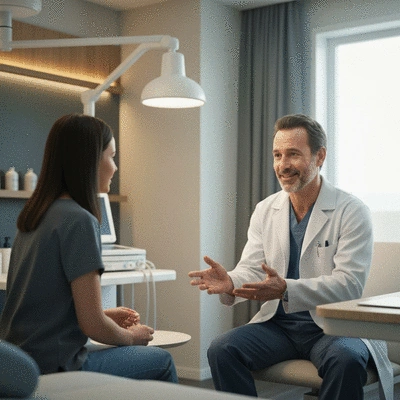Preventive Care in Allied Health

What if taking charge of your health could actually be a team effort? In the realm of healthcare, the importance of preventive strategies is often overlooked, but they hold the key to a healthier future. Through collaborative efforts among health professionals, we can truly transform our well-being.
What You Will Learn
- Preventive care emphasizes proactive health management to avoid illness, enhancing individual outcomes and overall healthcare efficiency.
- Education, screening, and vaccination are crucial components that form a robust framework for preventative strategies.
- Multidisciplinary collaboration among various health professionals leads to more comprehensive care and improved health assessments.
- Patient-centered care focuses on personalized assessments and setting realistic health goals, empowering individuals in their wellness journey.
- The future of preventive care includes increased telehealth access, innovative training for professionals, and improved data sharing among providers.
- Advocating for preventive care involves active communication with healthcare teams and staying informed about health literacy.
The Pillars of Multidisciplinary Preventive Care
Integrated Health Practitioners leverages a multidisciplinary approach for comprehensive preventive care, focusing on key components and collaborative benefits. This ensures a holistic view of patient health, fostering better long-term outcomes and a more efficient healthcare experience. Learn more about understanding integrated allied health care and how it underpins these efforts.
Understanding FoundationsKey Concepts of Preventive Care
- 1Education: Informed choices prevent disease.
- 2Screening: Early detection through regular tests.
- 3Vaccination: Immunizations protect against illness.
Enhanced OutcomesImproving Patient Outcomes Through Collaboration
- 1Holistic Approach: Considers all health aspects comprehensively.
- 2Comprehensive Care: Integrated services simplify healthcare.
- 3Enhanced Communication: Informed decisions from shared insights.
- 4Increased Accountability: Team approach monitors progress.
Modern AccessTelehealth: Expanding Access to Preventive Care
- 1Increased Accessibility: Connect from home, breaking barriers.
- 2Convenient Follow-ups: Regular check-ins without in-person visits.
- 3Broader Reach: Quality services for rural/underserved areas.
Patient EmpowermentHow to Advocate for Your Preventive Care
- 1Ask Questions: Inquire about preventive measures.
- 2Share Your Goals: Communicate wellness objectives with your team.
- 3Stay Informed: Keep up with research and recommendations.
The Importance of Preventive Care in Multidisciplinary Allied Health
At Integrated Health Practitioners, I often emphasize the value of preventive care within our multidisciplinary approach to health. Preventive care focuses on maintaining health and avoiding illness before it occurs. This proactive mindset can greatly enhance not just individual health outcomes but also the efficiency of our entire healthcare system.

Understanding preventive care is essential for anyone looking to take charge of their health. By investing in preventive strategies, we can reduce the burden of diseases, ultimately leading to a more vibrant community. As a professional in the allied health sector, I have witnessed firsthand how effective prevention strategies can transform lives!
Understanding Preventive Care: Key Concepts and Definitions
Preventive care can be broken down into several key concepts that highlight its importance:
- Education: Informing patients about healthy lifestyle choices that can prevent disease.
- Screening: Regular check-ups and tests to catch potential health issues early.
- Vaccination: Immunizations that protect against infectious diseases.
These components work together to create a robust framework for keeping individuals healthy. By prioritizing preventive care, practitioners can significantly improve the quality of life for their patients. Have you ever thought about how preventive measures might have changed your own health journey? Explore more about enhancing healthcare through collaboration.
Why Multidisciplinary Collaboration Enhances Preventive Strategies
Multidisciplinary collaboration among health professionals, such as physiotherapists, dietitians, and exercise physiologists, strengthens preventive strategies. By working together, we create a comprehensive approach that addresses all aspects of a patient's well-being.
- Shared insights: Different perspectives lead to more thorough health assessments.
- Comprehensive care plans: Tailored interventions that consider the full health spectrum.
- Increased accountability: Collaborative teams encourage adherence to health regimens.
As someone deeply rooted in integrated healthcare, I've seen how this collaboration not only enhances patient care but also fosters a nurturing environment for everyone involved. Together, we can achieve greater health outcomes!
Patient-Centered Care: Tailoring Preventive Approaches for Individuals
At Integrated Health Practitioners, we believe that patient-centered care is at the heart of effective preventive strategies. This means taking the time to understand each individual's unique needs and preferences.
- Personalized assessments: Gathering detailed health histories helps create tailored plans.
- Setting realistic goals: Collaborating with patients to establish achievable health objectives.
- Ongoing support: Continuous engagement to encourage adherence to preventive measures.
Have you considered the role that personalized care could play in your own health journey? By focusing on the individual, we empower our clients to take an active role in their wellness, leading to improved outcomes and a healthier community!
Exploring Levels of Prevention in Holistic Health
Pro Tip
To enhance your preventive care journey, consider scheduling regular check-ins with your healthcare providers. This proactive approach not only helps catch potential health issues early but also ensures that your personalized care plan remains aligned with your evolving health goals.
Summarizing the Benefits of Multidisciplinary Preventive Care
At Integrated Health Practitioners, I’ve seen firsthand how multidisciplinary preventive care can elevate health outcomes. By combining the expertise of various allied health professionals, we create a comprehensive support system that addresses the unique needs of each patient. This collaboration not only enhances the quality of care but also empowers individuals to take a proactive role in their health journey.

One of the most significant benefits is the ability to create personalized care plans. When different specialists—such as physiotherapists, dietitians, and exercise physiologists—work together, they can develop tailored strategies that resonate with each client's lifestyle and health goals. This synergy leads to better adherence to treatment plans and improved overall well-being.
Improving Patient Outcomes Through Collaboration
Collaboration among allied health professionals plays a crucial role in improving patient outcomes. Here are some of the key benefits:
- Holistic Approach: Integrating multiple perspectives ensures all aspects of a patient's health are considered.
- Comprehensive Care: Patients have access to a variety of services in one coordinated plan, simplifying their healthcare experience.
- Enhanced Communication: Regular updates and discussions among providers lead to more informed decision-making.
- Increased Accountability: A team approach allows for shared responsibility in monitoring progress and adapting strategies as needed.
In my experience, this collaborative model not only improves health outcomes but also cultivates a supportive environment that encourages patient engagement. Have you considered how your health could benefit from a team of professionals working together on your behalf?
Future Directions for Preventive Care in Allied Health
The future of preventive care in allied health is bright, with exciting developments on the horizon! As we witness an increased emphasis on preventive strategies, I believe we will see more integrated approaches that focus on the individual as a whole. This includes:
- Expansion of Telehealth: Virtual care options will become more prevalent, making it easier for patients to access multiple providers regardless of location.
- Innovative Training Programs: Allied health professionals will continue to engage in multidisciplinary training to enhance collaborative skills.
- Enhanced Data Sharing: Improved technology will facilitate seamless communication between healthcare providers, ensuring that everyone involved in a patient’s care stays informed.
These advancements signal a positive shift toward more accessible and effective preventive care, ultimately leading to better health outcomes for our communities.
The Role of Telehealth in Expanding Access to Preventive Care
Telehealth has become a game-changer in the landscape of preventive care. It offers numerous benefits, such as:
- Increased Accessibility: Patients can connect with specialists from the comfort of their homes, breaking down barriers related to travel and time constraints.
- Convenient Follow-ups: Regular check-ins via telehealth keep patients engaged and accountable without the need for in-person visits.
- Broader Reach: Those in rural or underserved areas can access quality health services that might have otherwise been unavailable.
As a passionate advocate for integrated healthcare, I see telehealth not just as a trend, but as a vital tool for enhancing access to preventive services. Are you ready to embrace this modern approach to health and wellness?
Engaging with Your Healthcare Team for Better Wellness Outcomes
How to Advocate for Preventive Care in Your Health Journey
Taking an active role in your health journey is essential! Here are a few ways to advocate for preventive care:
- Ask Questions: Don’t hesitate to inquire about preventive measures during your appointments.
- Share Your Goals: Communicate openly with your healthcare team about your wellness objectives.
- Stay Informed: Keep up with the latest research and recommendations to better understand your health needs.
By being proactive, you empower yourself and your healthcare providers to work together effectively. Remember, your health is a collaborative effort!
Call to Action: Embracing a Holistic Approach to Health and Wellness
Are you ready to take charge of your health? I encourage you to reach out to the diverse professionals at Integrated Health Practitioners and explore how our integrated approach can benefit you. Each step toward a holistic wellness journey is a step toward a healthier, happier life!
Understanding the Importance of Health Literacy in Patient Advocacy
Finally, understanding health literacy is vital for effective patient advocacy. Health literacy empowers you to:
- Make Informed Decisions: Knowing how to interpret health information helps you choose the right care options.
- Communicate Effectively: Understanding medical terms and procedures enables you to engage meaningfully with your healthcare team.
- Take Ownership: The more you understand your health, the better you can advocate for your needs.
Improving your health literacy can transform how you navigate your healthcare journey. Let’s work together to ensure you have the tools and knowledge needed to thrive! For more insights into how different specialists work together, read about allied health in team care.
Frequently Asked Questions (FAQs)
What is preventive care?
Preventive care focuses on proactive health management to avoid illness before it occurs. This includes education, screening, and vaccination to maintain overall well-being and enhance individual health outcomes.
How does multidisciplinary collaboration improve preventive care?
Multidisciplinary collaboration brings together various health professionals (e.g., physiotherapists, dietitians) to create a comprehensive approach. This leads to shared insights, more thorough health assessments, tailored care plans, and increased accountability, ultimately enhancing patient outcomes.
What are the key components of effective preventive strategies?
The key components include education (informing patients about healthy choices), screening (regular tests for early detection), and vaccination (immunizations against infectious diseases). These elements form a robust framework for keeping individuals healthy.
What is patient-centered care in the context of preventive strategies?
Patient-centered care involves understanding each individual's unique needs and preferences to tailor preventive approaches. This includes personalized assessments, setting realistic health goals in collaboration with patients, and providing ongoing support to encourage adherence to preventive measures.
How is telehealth impacting preventive care?
Telehealth is expanding access to preventive care by increasing accessibility (patients can connect from home), offering convenient follow-ups (regular check-ins without in-person visits), and providing a broader reach (quality services for rural or underserved areas).
Recap of Key Points
Here is a quick recap of the important points discussed in the article:
- Preventive Care Importance: A proactive approach to health that focuses on maintaining wellness and avoiding illness.
- Multidisciplinary Collaboration: Working together with various health professionals enhances patient care and outcomes.
- Patient-Centered Strategies: Tailoring preventive care to individual needs leads to more effective health interventions.
- Future of Preventive Care: The rise of telehealth and innovative training will improve access and collaboration among healthcare providers.
- Health Literacy: Understanding health information empowers patients to make informed decisions and advocate for their health.









